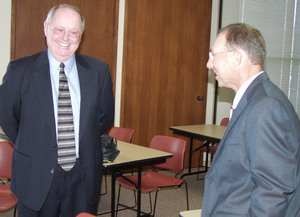North Platte Canteen story told at Chadron State

The story of the famous North Platte Canteen that was located in the Union Pacific Railroad depot and served an estimated six million troops during World War II was told at the Phi Alpha Theta History Fraternity program at Chadron State College last week.
The speaker was Ben Harvey, a native of Kearney who has the executive director of the Masonic Eastern Star Home for Children in Fremont the past 24 years. He has thoroughly researched the history of the canteen, although he said few records were kept. It seems those involved were too busy handing out chicken salad sandwiches, hard-boiled eggs, bottles of milk and birthday cakes to write down the daily activities.
Harvey said the good deeds began on Dec. 17, 1941, just a few days after the bombing of Pearl Harbor, even though things didn’t work out as planned.
Word had spread in North Platte that a National Guard unit, Company D, would be passing through North Platte about 5 p.m. on that date. Numerous North Platte men were attached to Company D and had been training in California. Thus several North Platte citizens gathered up some goodies and waited to pass them out when the UP train stopped for water.
The train was late, but the Good Samaritans remained at the depot. When it finally arrived, they didn’t know any of the troops because this was Company D from Kansas. The treats were handed out, anyway, and because of the positive response, it was decided to do the same for all the trains containing troops that chugged through North Platte.
Harvey said the next troops to be feted arrived on Christmas night. For the next 51 months—or until April of 1946—the troops on every train that stopped in North Platte were treated to a snack.
The logistics of the activity are staggering. Up to 15 trains a day, some arriving as early as 5 a.m. and others at midnight, stopped in North Platte. The daily count often ranged from 5,000 to 8,000. The food was placed on U-shaped tables and boys helped themselves.
A nearby garage was the initial headquarters for the project. But as the number of trains and troops grew, much more room was needed. Before long, the president of UP, North Platte native William Jeffers, decreed that the West Wing of the depot where a restaurant had been located, could be used as the canteen.
Harvey said in the early 1940s, North Platte had about 10,000 residents. But lots of help from others would be needed. Eventually, the churches, civic clubs, fraternal organizations and common citizens from 125 communities, some as far away as northern Kansas and eastern Colorado, were involved. Volunteers contributed food and money to keep the project going. Some of those helping also rode the trains to reach the canteen. Others pooled their World War II ration tickets to purchase gas to make the trip and to buy sugar to bake the goodies.
“There were about 125 canteens nationally, but none operated as extensively as the North Platte Canteen,” Harvey said. “They never missed a train in all those years. And, they never charged a dime for anything they served. The amount of food they served is staggering.”
Harvey said ham, chicken, turkey and even pheasant salad sandwiches were popular. The troops also gobbled down hard-boiled eggs after having been fed powdered eggs by the military. Coffee and milk were consumed by the gallons. Sweet corn was a favorite late in the summers. At least a dozen birthday cakes were baked and passed out on a daily basis. Platform girls helped greet the troops, showed them the way to the canteen and sang “Happy Birthday” to those who were celebrating.
Books and magazines also were made available for the troops to take with them.
Since this was before paper and plastic products were in vogue, boxes were placed on the trains to collect the plates, silverware, bottles and jars that went with the troops. At the next stop, the train conductors would set off the boxes so they could be returned to North Platte, washed and reused.
One of Harvey’s stories involved a high school girl in Tryon who put her name and address inside a popcorn ball she had made to be passed out to the troops. The lucky soldier responded and they were eventually married. He said a buddy asked the troop if his new sweetheart had a sister. She did, another correspondence began and they also were married after the war.
Unfortunately, the depot was “knocked down in the middle of the night” by the Union Pacific in 1973, robbing North Platte of a place to commemorate the canteen. However, the Lincoln County Museum contains many letters of appreciation that the troops sent back to the community.
Harvey added that at least one of the troops, a businessman in Georgia who prospered and has no children, has donated several hundred thousand dollars to projects in North Platte in recent years because of the “10 minutes of kindness he was shown.”
Category: Campus Events, Campus News
